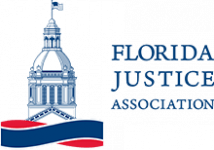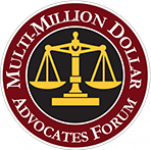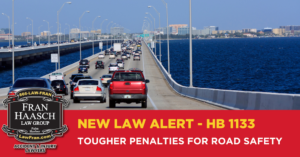If you’re a motorcycle enthusiast, then you know that there is nothing quite like the feeling of the wind blowing through your hair as you speed down the open road. But before you take your bike out for a spin, it’s important to make sure that you have the proper motorcycle insurance coverage. In this blog post, we will discuss some of the different types of motorcycle insurance coverage available and help you decide which one is right for you.
The Fran Haasch Law Group has a team of attorneys who will make sure your rights are protected at every turn if you’re ever in a motorcycle accident that’s not your fault. We hope this never happens to you, of course, but we want you to be covered if it does. If you would like a free case evaluation, get in touch with us as soon as you can.

Do You Need Motorcycle Insurance?
In most states, motorcycle insurance is mandatory, but there are a few exceptions. For example, Florida does not require motorcycle riders to have insurance, but you could face liability for the damages if you’re to blame for an accident.
You should also know that PIP (personal injury protection) coverage doesn’t apply in Florida, and this type of coverage only applies to auto insurance or truck insurance.
Types of Motorcycle Insurance Coverage
There are various motorcycle insurance coverage options available, and each one provides a different level of protection. Here are some of the most common types of motorcycle insurance coverage:
– Bodily Injury Liability: This type of coverage pays for damages you may cause to another person in an accident. It also covers their medical expenses and lost wages.
– Property Damage Liability: This type of coverage pays for damages that you may cause to someone else’s property in an accident.
– Collision Coverage: This type of coverage pays for repairs or replacement costs if your motorcycle is damaged in a collision with another vehicle or object.
– Comprehensive Coverage: Comprehensive insurance pays for damages that are not caused by a collision, such as theft or vandalism.
– Uninsured/underinsured motorist coverage: Uninsured/underinsured coverage is also optional but highly recommended. This coverage protects you if you suffer an injury in an accident with a driver who does not have insurance or enough insurance to cover the damages.
– Medical payments coverage is optional but may be a good idea if you are not covered by health insurance. This coverage pays for medical bills related to an accident, regardless of who is at fault.
– Roadside assistance coverage can pay for the cost of towing your bike to the nearest mechanic if it’s no longer operational. This works much like the roadside assistance coverage you may have on your car insurance policy.
What are the Coverage Amounts for Motorcycle Liability Insurance?
The amount of motorcycle liability insurance you need will depend on the type of coverage you choose. But typically, bodily injury liability insurance is $100,000 per person and $300,000 per accident. Property damage liability insurance is usually around $50,000.
When Should I Buy Motorcycle Insurance?
It’s always a good idea to buy motorcycle insurance before taking your bike out for a spin. That way, you know that you are protected in the event of an accident. You can purchase motorcycle insurance online or through your local agent.
Deciding Which Coverage Is Right for You
When deciding which motorcycle insurance coverage is right for you, it’s important to consider your needs and budget. If you only ride your motorcycle occasionally, then basic liability coverage may be all you need. But if you use your motorcycle for commuting or long-distance trips, then you may want to consider purchasing more comprehensive coverage.
No matter what type of motorcycle insurance coverage you choose, make sure that it meets the minimum requirements in your state. And most importantly, be sure to read the fine print to understand what is and is not covered.
How Much Does Motorcycle Insurance Cost??
The cost of motorcycle insurance varies depending on a variety of factors, including the type of coverage you choose, your age and driving history, and the make and model of your motorcycle. On average, motorcycle insurance costs between $200 and $500 per year.
Make sure to shop around for the best rates, as different insurers can charge vastly different premiums for the same coverage. And be sure to ask about discounts if you have multiple policies with the same insurer or if you are a member of a motorcycle association.
Motorcycle Insurance Tips
Here are a few tips to help keep your motorcycle insurance costs down:
– Ride safely and obey all traffic laws: This may seem like common sense, but following the rules of the road can help keep your rates down. In addition, insurers look at motorcycle accidents and claims as a sign of high risk, so riding safely can help you keep your premiums low.
– Keep your motorcycle in good condition: A well-maintained bike is less likely to have mechanical problems, which can lead to accidents. This can also help you save on your motorcycle insurance premiums.
– Shop around for the best rates. Motorcycle insurance rates vary depending on a number of factors, including the type of coverage you choose, your age and driving history, and the make and model of your motorcycle.
– Add safety features to your motorcycle. Many insurers offer discounts for motorcycles equipped with safety features like anti-theft devices, ABS, or traction control.
Is GAP Motorcycle Coverage Necessary?
Gap motorcycle coverage is an optional, but highly recommended, insurance policy that covers the difference between the value of your motorcycle and the amount you still owe on your loan. This coverage can be especially helpful if your motorcycle is stolen or damaged beyond repair.
When deciding whether or not to purchase gap motorcycle coverage, it’s important to consider your budget and how much you still owe on your motorcycle loan. For example, if you have a high-interest loan or you don’t have enough savings to cover the cost of a new motorcycle, then gap motorcycle coverage may be a wise investment.
But if you have a low-interest loan or plenty of savings, then gap motorcycle coverage may not be necessary. Talk to your insurer about the pros and cons of gap motorcycle coverage and decide what’s best for you.
How Does Insurance Pay Out if a Motorcycle is Stolen or Destroyed?
If your motorcycle is stolen or destroyed, the insurance company will pay out based on the motorcycle’s value at the time of the accident. Most policies have a maximum payout amount, so make sure you know how much your policy covers.
Additionally, if your motorcycle is damaged in an accident but is still drivable, you may be able to keep it and repair it yourself. In this case, the insurance company will reimburse you for the cost of repairs minus your deductible.
Be sure to talk to your insurer about what types of accidents are covered under your policy and what type of documentation you will need to file a claim.
Exclusions from Motorcycle Insurance Coverage
It’s important to be aware that motorcycle insurance does not cover all types of accidents. There are a number of situations where you would be responsible for the costs yourself, including:
– Riding while drunk or impaired
– Racing your motorcycle
– Operating your motorcycle without a valid license or registration
– Damaging your motorcycle on purpose for financial gain
– Using your motorcycle in connection with a criminal activity
Be sure to read your policy carefully to understand what is and is not covered. If you have any questions, don’t hesitate to contact your insurer.
Motorcycle Insurance FAQs
Q: What does motorcycle insurance cover?
A: motorcycle insurance can provide a variety of different types of coverage, including liability, collision, and comprehensive coverage. It can also provide uninsured/underinsured motorist coverage and medical payments coverage.
Q: What type of motorcycle should I buy if I want to save on my motorcycle insurance?
A: Buying a less expensive or smaller motorcycle can help you save on your premiums. If you are looking for a high-performance bike, be prepared to pay more for motorcycle insurance.
Q: What should I do if I’m involved in a motorcycle accident?
A: If you are involved in a motorcycle accident, you should contact the police and your insurer immediately. It’s also important to seek medical attention if you are injured.
Q: Can I get motorcycle insurance without a motorcycle license?
A: Yes, you can get motorcycle insurance without a motorcycle license. However, you may be required to provide proof of driving experience or take a safety course.
Q: What is uninsured/underinsured motorist coverage?
A: uninsured/underinsured motorist coverage protects you if you are injured in an accident with a driver who does not have liability insurance or enough insurance to cover the damages. It can also provide coverage for your passengers.
Q: What is collision coverage?
A: collision coverage pays for the damage to your motorcycle caused by an accident. It typically covers the cost of repairs or the value of your motorcycle if it is declared a total loss.
Q: What is comprehensive coverage?
A: comprehensive coverage pays for damages to your motorcycle that are not caused by a collision, such as theft, fire, or vandalism.
Q: Is there a deductible on my motorcycle insurance policy?
A: Yes, most motorcycle insurance policies have a deductible, which is the amount you must pay out-of-pocket before the insurance company reimburses you for covered damages. The deductible amount varies depending on the policy and the type of claim.
Q: What is motorcycle lay-up insurance?
A: Motorcycle lay-up insurance is a policy that provides coverage for your motorcycle when it is not in use. This can be a helpful option if you are not using your motorcycle during the winter months or taking a long trip and will not be using your bike while away.
Get in Touch with The Fran Haasch Law Group
The attorneys with The Fran Haasch Law Group are passionate about our clients, as well as motorcycles. We’ll be here if you’re ever in an accident caused by another party’s negligence. Contact us for a free evaluation of your case to learn more.













